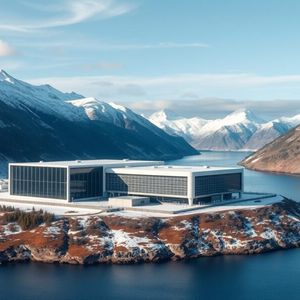OpenAI’s Bold European Leap: First AI Data Center Arrives in Norway
6 min read
BitcoinWorld OpenAI’s Bold European Leap: First AI Data Center Arrives in Norway The world of artificial intelligence is moving at an unprecedented pace, and with it, the demand for robust infrastructure. For those keenly observing the intersection of technology and global strategy, OpenAI’s latest announcement marks a significant milestone. The AI giant, known for its groundbreaking models like ChatGPT, is set to launch its first European AI data center in Norway . This strategic move, named Stargate Norway, is more than just a facility; it’s a powerful statement in the global race for AI dominance and AI sovereignty . OpenAI’s Strategic European Expansion: Why Norway? OpenAI has officially unveiled its plans for Stargate Norway, a massive AI data center project. This initiative is a collaborative effort involving British AI cloud infrastructure provider Nscale and Norwegian energy infrastructure firm Aker. The venture is structured as a 50/50 joint enterprise between Nscale and Aker, with Nscale taking the lead in designing and building the site. OpenAI will act as an “off-taker,” securing a substantial portion of the data center’s capacity. The choice of Norway for this monumental undertaking is highly strategic. OpenAI highlighted several compelling reasons for selecting a site near Narvik, a small town in northern Norway: Access to Hydropower: The region boasts abundant and reliable hydropower, ensuring the data center will run entirely on renewable energy. This aligns with global sustainability goals and reduces the environmental footprint of energy-intensive AI operations. Cool Climate: Northern Norway’s naturally cool climate is ideal for managing the immense heat generated by AI compute infrastructure. This allows for efficient cooling solutions, such as closed-loop, direct-to-chip liquid cooling, maximizing operational efficiency. Mature Industrial Base: The area offers a well-established industrial foundation, providing the necessary support and expertise for such a large-scale project. Initially, Stargate Norway is projected to deliver 230 megawatts (MW) of capacity, with ambitious plans to expand to 290 MW. By the end of 2026, the facility is expected to house an impressive 100,000 Nvidia GPUs, underscoring the sheer scale of compute power it will bring online. The Rise of AI Data Centers: Powering Europe’s Future The announcement of Stargate Norway comes at a critical juncture when Europe is intensifying its efforts to achieve AI sovereignty and significantly boost its AI data center and compute power capabilities. Just recently, the European Union detailed its multi-billion-euro investment strategy into AI infrastructure. This includes a commitment of 10 billion euros to establish 13 “AI factories” and an initial investment of 20 billion euros into these crucial facilities. The drive for data sovereignty is a core component of this mission. Given the sensitive nature of business and government data, controlling where and how this data is processed is paramount for national security and economic independence. While it remains unclear if OpenAI ’s Stargate Norway is directly integrated into the EU’s broader AI scaling plans, Nscale CEO Josh Payne indicated that a key objective of the project is to “leverage European sovereign compute” for the continent’s benefit. Furthermore, Norway ’s own AI ecosystem, including local startups and scientific researchers, is slated to receive priority access to the new center, fostering domestic innovation. The initial phase of the project, a 20 MW segment, has already seen Nscale and Aker commit approximately $1 billion each, demonstrating the significant financial backing behind this ambitious venture. This investment highlights the growing recognition of AI data centers as foundational pillars for future economic growth and technological advancement. Achieving AI Sovereignty: Europe’s Grand Vision Europe’s regulatory landscape is actively shaping the future of AI infrastructure. The EU AI Act, which became effective in August 2024, mandates that companies developing AI data centers must implement measures to protect the environment and maintain transparency regarding the energy consumption of their AI models. This legislation aims to mitigate potential negative impacts while fostering responsible innovation. Complementing the AI Act is the bloc’s Energy Efficiency Directive, which places a strong emphasis on energy efficiency within the Information and Communication Technology (ICT) sector, including data centers. A notable requirement of this directive is that data centers exceeding specific energy input thresholds must recover and utilize waste heat. OpenAI ’s commitment to making excess heat from Stargate Norway’s GPU systems available to support local low-carbon enterprises directly addresses this directive, showcasing a model for sustainable data center operation. These regulatory frameworks underscore Europe’s dedication not only to technological advancement but also to ensuring that this progress is environmentally conscious and aligned with strategic AI sovereignty goals. By fostering compute capabilities within its borders, Europe aims to reduce reliance on external providers and secure its digital future. Nscale and Aker: The Powerhouse Partnership Driving Innovation The collaboration between Nscale and Aker is central to the realization of Stargate Norway. Nscale, as a British AI cloud infrastructure provider, brings specialized expertise in designing and building large-scale, high-performance data centers tailored for AI workloads. Their involvement ensures that the facility will be optimized for the demanding requirements of advanced AI models, capable of housing tens of thousands of Nvidia GPUs. Aker, a prominent Norwegian energy infrastructure firm, provides critical local knowledge, financial backing, and access to Norway ’s rich renewable energy resources. Their joint venture structure signifies a deep commitment from both parties to the project’s success and its long-term impact on the European AI landscape. This partnership exemplifies how cross-border collaboration can accelerate the development of crucial AI infrastructure, combining technical prowess with strategic regional advantages. What Does This Mean for the Future of AI? OpenAI ‘s investment in Stargate Norway is part of a broader global strategy to expand its AI infrastructure footprint. This announcement follows closely on the heels of other significant commitments: United States: Seven months prior, OpenAI announced a massive $500 billion investment over four years into 10 gigawatts of AI infrastructure in the U.S., in partnership with Oracle and Softbank. United Arab Emirates (UAE): Earlier this year, OpenAI launched Stargate UAE, signaling its expansion into the Middle East. United Kingdom: A recently signed deal with the UK government aims to accelerate AI adoption and boost infrastructure development. These global ventures highlight OpenAI ‘s relentless pursuit of greater compute power, which is essential for developing increasingly complex and capable AI models. The Norwegian AI data center , with its focus on renewable energy and efficient cooling, sets a precedent for sustainable AI development. It also reinforces the idea that AI innovation is not confined to a single region but is a global endeavor, with different nations contributing unique strengths. For the cryptocurrency and broader tech community, this move by OpenAI signals continued rapid advancement in AI capabilities. As AI models become more sophisticated, their computational demands grow exponentially. Investments in massive AI data centers like Stargate Norway are foundational to this progress, indirectly impacting areas like blockchain technology, decentralized AI , and the broader digital economy by making advanced compute resources more accessible and efficient. The emphasis on sustainability also resonates with the growing demand for eco-friendly tech solutions across all sectors. In conclusion, OpenAI ‘s decision to establish its first European AI data center in Norway is a landmark development. It represents a significant step forward in securing Europe’s AI future, promoting sustainable technological growth, and fostering international collaboration. This facility will not only provide immense compute power for OpenAI ’s ambitious projects but also serve as a beacon for environmentally responsible AI infrastructure, solidifying Norway ‘s role in the global AI landscape and contributing significantly to the continent’s drive for AI sovereignty . To learn more about the latest AI market trends, explore our article on key developments shaping AI features. This post OpenAI’s Bold European Leap: First AI Data Center Arrives in Norway first appeared on BitcoinWorld and is written by Editorial Team

Source: Bitcoin World


